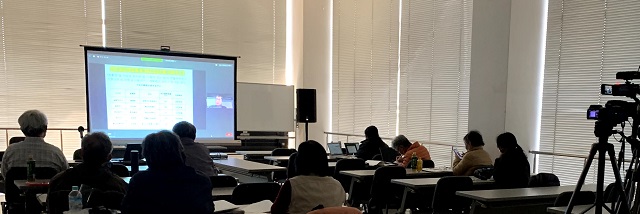ESD-J is a gathering of NGO/NPOs and individuals involved in social issues such as the environment, development, human rights, peace and gender, joining forces for the purposes of searching for and realizing forms of education that can be shared by all.
Organization
ESD-J is an Intermediary for Fostering ESD
Founded on June 21, 2003, the Japan Council on the UN Decade of Education for Sustainable Development (ESD-J) is a networking organization dedicated to promoting education for a sustainable society, given impetus by the UN Decade of Education for Sustainable Development (DESD). ESD-J is a gathering of NGO/NPOs and individuals involved in social issues such as the environment, development, human rights, peace and gender, joining forces for the purposes of searching for and realizing forms of education that can be shared by all. ESD-J also works with the government, local authorities, companies and educational institutions to promote ESD.
Establishment Prospectus
UN Decade of Education for Sustainable development : hereafter referred to as the ‘Decade of ESD’ which started in 2005, entails active efforts made by participating countries towards the education necessary to make sustainable society a reality.
These efforts include the promotion of international cooperation by appealing through the UN to various governments. Under the proposal of a Japanese NGO working towards the Johannesburg summit, the Japanese government made proposals incorporated within the summit’s practice reports, and these were approved, so the campaign was adopted at the 57th UN General Assembly in 2002.
‘ESD (Education for Sustainable Development)’is not yet a consolidated notion, however it is internationally acknowledged that it contains a variety of issues and it’s ideology and promotion should be made to take root in communities around the world. Therefore, it is important, that we, individual citizens from all over the world, think about what a sustainable society is, and what ESD is, and the need for a support network to establish an ESD environment. Also, it is necessary to encourage Japanese citizens to voice their opinions and reflect on Asian viewpoints in international discussions of ESD concepts and contents.
Given impetus by the ‘UN Decade of ESD,’ on 21st June 2003, a volunteer council was established to promote the ‘Decade of ESD.’ The goal of the council is to link the efforts of NGOs, NPOs and individuals engaged in educational activities relating to Japan’s social issues such as environment, development, human rights, peace, gender, multicultural harmony and health as well as to establish a nationally and internationally common understanding of the ideal ESD stance.
With these principles and outcome of these activities, we decided to contribute to promote education to realize sustainable society by collaborative activities and proposals to central and local governments, business entities and educational institutions. To meet these goals we established the NPO Japan Council on the UN Decade of ESD (ESD-J).
Specifics of what we aim to achieve through our activities is stated below.
- To create networks enabling NGOs, etc. in different fields to complement each other’s activities for the creation of a sustainable society.
- To act as the government’s counterpart, by advocating policy proposals and collaborating in policy implementation aimed at encouraging citizens and NGOs to form partnerships with the government, local authorities, international organizations and educational institutions in order to realize substantive ESD nationwide and overseas.
- To strengthen the framework that enables NGOs and other groups to participate actively in the creation of a sustainable society through school and community education, community building, etc.
- To act as a contact point for the DESD.
- To develop training programs for NGO staffers to enable them to participate in international policy decision-making processes.
- To promote measures which enable Japanese NGOs to deliver project proposals and acquire funding from international agencies
Board Members
Chair
- Toshiya Kodama(Mr.)Professor, Azabu University
- Katsunori Suzuki(Mr.)
Vice-Chair
- Takashi Asai (Mr.) UNU Alumni Association
- Mitsuyuki Ikeda(Mr.) Okayama UNESCO Association
Board Member
- Takashi Asai(Mr.)
- Mitsuyuki Ikeda(Mr.)
- Yoko Shinkai (Ms) SDGs Community
- Ryou Asano (Mr.) Kesennuma City/Miyagi University of Education Collaboration Center
- Yuji Kanazawa (Mr.)
- Takeshi Toyao (Mr.) Kiyosato Educational Experiment Project/Center for Climate Actions Yamanashi Prefecture
- Mitsuhiko Fukui (Mr.) Aomori University
- Hideto Matsuura (Mr.) Higashimiyoshi Town, Tokushima Prefecture/Sora no Sato
- Naoko Matsuda (Ms.) Citizen’s Environmental Foundation
- Hiroyuki Miyake (Mr.) Kitakyushu ESD Council/Kitakyushu City University
- Ryouta Yogi (Mr.) National Institution For Youth Education
Auditors
- Satoshi Asami (Mr) Accountant
- Mutsuko Yoshioka(Ms) Lawyer
Advisers
- Kayoko Ikeda (Ms) – Literature Translator/Researcher
- Shigeyuki Okajima (Dr) – Chairman, Educational foundation Aomori Yamada Gakuen
- Mikio Takagi(Mr.) – CEO, Nichinoken Co., Ltd.
- Ryokichi Hirono (Prof) – Honorary professor, Seikei University
Counselor
- Osamu Abe(Prof) Rikkyo University
- Masako Shige (Ms) Council for Outdoor & Nature Experiences (CONE)
Secretariat
- Miho Yokota(Ms.) – General Secretary
- Saori Saitou(Ms.)
- Naomi Goto(Ms.)



